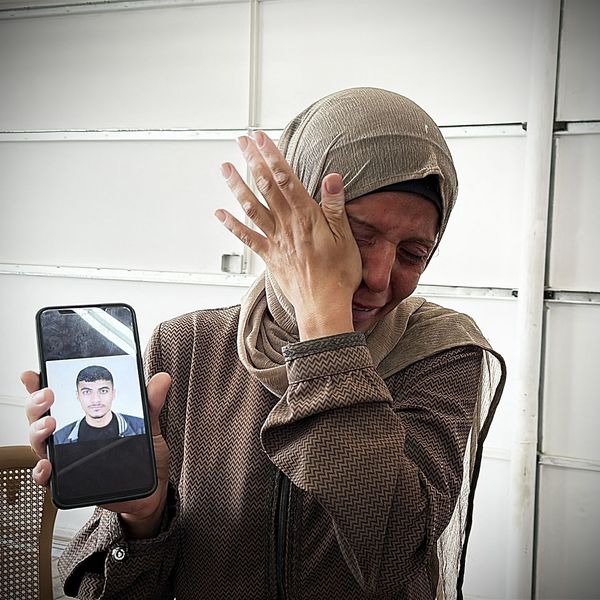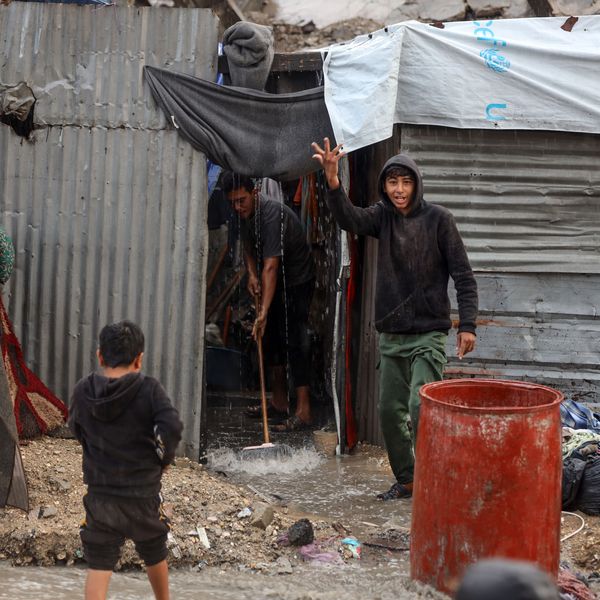An increasing number of Palestinians held in administrative detention in Israel are turning to hunger strikes to protest Israel's unjust detention policy.
Amnesty International states that "Israeli military orders allow the authorities to detain Palestinians from the occupied West Bank without trial indefinitely under administrative detention if they are deemed to be a 'security threat.'"
Palestinians are being detained without charges, leaving them with no idea of when they will be released, and without charges, don't even know why they have been detained.
One of the over 300 Palestinians currently held in administrative detention is 29-year-old Hana Shalabi, who has begun her 43rd day of a hunger strike. Sahar Francis, Director of the Ramallah-based Addameer Palestinian prisoner support organisation, told Inter Press Service that almost 30 detained Palestinians have also begun hunger strikes with the number growing.
Last month Khader Adnan stopped a 66-day hunger strike during detention when he was given a release day for April.
* * *
Inter Press Service: Palestinian Prisoners Fight Back With Hunger
JERUSALEM - As 29-year-old Palestinian prisoner Hana Shalabi enters day 43 of her open- ended hunger strike Thursday from a hospital bed in northern Israel, over two dozen other Palestinian prisoners have now followed suit, refusing food as a way to protest their arrest, detention and treatment in Israeli prisons.
"The hunger strikes are highlighting the conditions and the treatment that these prisoners face in the Israeli system, whether in the process of their detention or later in interrogation or in the courts or in the prisons," Sahar Francis, Director of the Ramallah-based Addameer Palestinian prisoner support organisation, told IPS.
"It's a whole system that's built on the oppression and violation of basic rights of these detainees and prisoners," Francis said. [...]
Processed through Israel's military courts system in the West Bank, Palestinian prisoners can be held indefinitely for renewable, six-month periods under Israeli administrative detention, and don't know when, or if, they will be released.
In February, Palestinian political prisoner Khader Adnan ended a 66-day hunger strike after the Israeli authorities agreed to release him in mid-April, a few weeks before his first six-month administrative detention term was scheduled to end, and agreed not to issue a new detention order.
Since that time, almost 30 Palestinian prisoners in Israeli jails have also begun their own hunger strikes, Francis said, and the number is growing daily.
* * *
The Sydney Morning Herald: Hunger strike by Palestinian prisoners grows
Two other hunger strikers have gone without food for 25 days each, while a 72-year-old prisoner had not eaten for a week, Ms Litvin said.
There are fears hospital and prison officials are preparing to initiate a force-feeding regime for Ms al-Shalabi, which would be a breach of both international law and medical ethics, she said.
There are about 320 Palestinians being held without charge in Israeli jails, including one held for more than three years and two for more than two years, says human rights group B'Tselem.
Last month, Khader Adnan, also being held on administrative detention, stopped his 66-day hunger strike, which had left him close to death, when Israeli authorities agreed to release him on April 17.
* * *
Al Jazeera video: Hunger strike a last resort for Palestinian prisoners
* * *
Amnesty International: Palestinian hunger striker 'at risk of death' highlights injustice of administrative detention
"Amnesty International has repeatedly called on the Israeli authorities to release Hana Shalabi and other Palestinians held in administrative detention, unless they are promptly charged with internationally recognizable criminal offences and tried in accordance with international fair trial standards."
Israeli military orders allow the authorities to detain Palestinians from the occupied West Bank without trial indefinitely under administrative detention if they are deemed to be a "security threat".
Hana Shalabi began her hunger strike in protest against ill-treatment during her arrest on 16 February, and continued in protest against her detention without charge or trial after receiving an administrative detention order five days later.
A doctor from Physicians for Human Rights - Israel (PHR) who saw her on Monday reported that she was at risk of death because she could suffer from heart failure at any moment, and called for her immediate hospitalization.
According to PHR, she has lost 14kg (31lbs) since her arrest, and suffers from impaired thyroid functions and severe pain, weakness and dizziness.
"While in detention, she - and all other Palestinian detainees who have joined her hunger strike in protest against the policy of administrative detention - must be treated humanely at all times and receive regular access to necessary medical treatment by an independent physician in a setting that respects the privacy of the doctor and patient, " said Ann Harrison. [...]
Hana Shalabi was one of 1,027 Palestinian prisoners and detainees freed from Israeli jails as part of a deal to free captured Israeli soldier Gilad Shalit in October and December last year. Before she was re-arrested in February, she had planned to study nursing at al-Rawda College in Nablus.
Prior to her release in October 2011, she was held for 25 months without charge or trial in HaSharon prison, under administrative detention orders that were repeatedly renewed.


